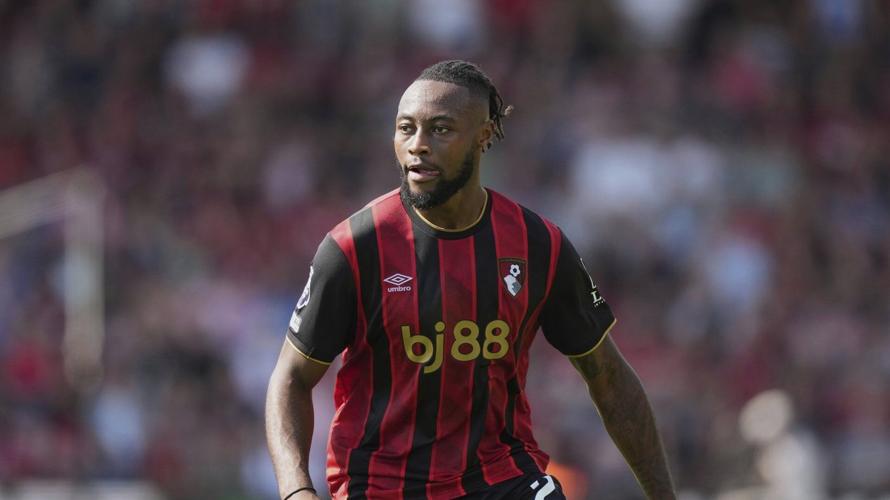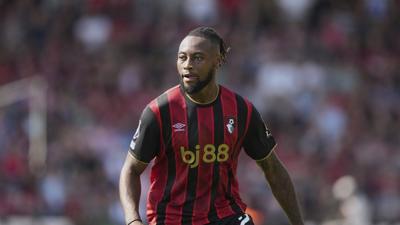The Premier League season wasnŌĆÖt even 30 minutes old when Bournemouth forward Antoine Semenyo reported being racially abused by a spectator.
The same weekend, a German Cup match after Schalke midfielder Christopher Antwi-Adjei was racially abused at a throw-in.
In Italy, Juventus condemned racist abuse targeting U.S. player as he warmed down after a league game.
And in Spain, police on Wednesday for allegedly making monkey noises and gestures toward Real Madrid star Kylian Mbapp├® during a match on Aug. 24.
An early-season surge in abuse directed at Black players in competitions across Europe has alarmed anti-discrimination campaigners and highlighted how racism persists in soccer despite multiple initiatives by soccer bodies FIFA and UEFA, national federations and individual clubs to eliminate it.
ŌĆ£I think itŌĆÖs more than double what we had last season at the same time,ŌĆØ said Piara Powar, executive director of the Fare network, an anti-discrimination group which works with the global and European soccer bodies to monitor and advise on incidents at games.
ŌĆ£If you layer on top of that,ŌĆØ Powar added in a phone interview, referencing at the WomenŌĆÖs European Championship this summer, ŌĆ£then you really are getting into a lot of stories coming out.ŌĆØ
Frustrated at the lack of progress, some Black players have called for tougher penalties against offenders from both the justice system and soccer institutions.
ŌĆ£In this day and age, weŌĆÖre still, us players, getting racially abused and it just doesnŌĆÖt make sense,ŌĆØ Semenyo told British broadcaster ITV. ŌĆ£We just want to know why it keeps happening.ŌĆØ
The man arrested on suspicion of hurling abuse at Semenyo in the Premier League opener against Liverpool was released on bail and told he cannot go within 1 mile (1.6 kilometers) of a soccer stadium in Britain while police investigate the incident.
Long history
Soccer’s tribal culture and frenzied fan base makes it a prime stage for societal problems like racism to surface. English soccer had a particularly harrowing time with racism in the 1970s and ŌĆÖ80s when Black players were regularly subjected to monkey chants and offensive slurs.
A generation later, racial abuse of players is more common in but also continues in stadiums. A high-profile example came in Spain in 2023 when Real Madrid’s Vin├Łcius J├║nior who called him a monkey. Months earlier, four people hung an effigy of the Brazilian player off a highway bridge, resulting in this year.
SoccerŌĆÖs governing bodies have struggled to stamp out the problem, despite measures such as longer bans for players, heavier fines for clubs, partial stadium closures, points deductions and a three-step protocol used by referees when racism occurs in matches.
the soccer federations of Albania, Serbia, and Bosnia and Herzegovina for offenses including racism during World Cup qualifiers they hosted in June. Argentina, Colombia and Chile also were punished for what FIFA said was ŌĆ£discrimination and racist abuse.”
FIFA created a racism task force in 2013 but controversially three years later, saying it had ŌĆ£completely fulfilled its temporary mission.”
Last week, FIFA announced its latest initiative: a , including soccer greats such as George Weah and Didier Drogba, which will advise on anti-racism initiatives.
ŌĆ£They will further push for a shift in football culture,ŌĆØ FIFA President Gianni Infantino said about The PlayersŌĆÖ Voice Panel, ŌĆ£making sure measures to counter racism are not just talked about, but actioned, both on and off the pitch.ŌĆØ
One member of the panel, former Manchester United defender Mikael Silvestre, said he received racist insults on Instagram the day after the initiative was announced.
ŌĆ£It was a surprise,ŌĆØ Silvestre said in comments provided by FIFA, “but it made me even more motivated.ŌĆØ
Greater awareness
Powar said his organization, which sends observers to menŌĆÖs matches in international soccer and European club competitions, has sent reports to UEFA and FIFA for 18 alleged discriminatory incidents so far this season, excluding online incidents. Based on news reports and its own observations, the Fare network found 90 clear incidents of discrimination in 67 matches. Nearly half of them involved racism.
Powar said there was ŌĆ£more awarenessŌĆØ of racist incidents happening in soccer, mainly because of increased media coverage, but was still surprised to see so many reports so early in a season. He suggested a heightened focus on migration in European politics may have contributed to the surge.
ŌĆ£Every week now we are seeing far-right parties, parties of the center-right, prioritizing migration as an issue that Europe needs to get a grip of,ŌĆØ he said. ŌĆ£And that inevitably plays out amongst fan groups, many of whom have a far-right agenda in any case, and it plays out in the minds of the general public.ŌĆØ
Jacco van Sterkenburg, a professor of race, inclusion and communication in soccer and the media at Erasmus University in Rotterdam, cautioned against blaming racism in soccer on broader political trends.
ŌĆ£Football itself produces racism that to some extent is independent from society,ŌĆØ Van Sterkenburg said, ŌĆ£because behind it are some aspects like, for example, (the lack of) diversity of boardrooms, in coaching staffs.ŌĆØ
UEFA President Aleksander ─īeferin on Thursday said soccer should unite and not divide people.
ŌĆ£And we have to try to get rid of those idiots whose football match is for their idiotic ideology, everywhere, not only in one country but in all the countries because these people donŌĆÖt love football,ŌĆØ he said at the UEFA Executive Committee meeting in Albania.
Bigger consequences
Organizations like FIFA and UEFA have to tread a fine line as they balance being a competition organizer as well as a regulatory body.
Powar pointed to the example of Mexico, a co-host of next yearŌĆÖs World Cup whose federation is getting regularly fined because of its fansŌĆÖ use of a during matches.
ŌĆ£FIFA has fined them probably close to 20 times over the last few seasons,ŌĆØ Powar said, ŌĆ£and really, given their offenses, they should be closer to being kicked out of the FIFA World Cup.ŌĆØ
Gary Neville, the former Manchester United and England defender, also wants there to be a bigger ŌĆ£consequenceŌĆØ for offenders.
Neville is a co-owner of English fourth-tier team Salford City, whose players walked off the field during a friendly match at York in July after one of them was allegedly racially abused by a home supporter.
Speaking at the launch of UK anti-discrimination group Kick It Out’s five-year Neville said the conversation on racism must move beyond education.
ŌĆ£Should the (offender’s) employer be contacted? Should there be further punishment for the club? Should the players continue to be on the pitch?” he asked. ŌĆ£We have to take the conversation beyond what is the norm because I just see exactly the same response every single time.ŌĆØ
___
AP Sports Writer Graham Dunbar and Llazar Semini in Tirana, Albania, contributed to this story.
___
AP soccer:
































To join the conversation set a first and last name in your user profile.
Sign in or register for free to join the Conversation